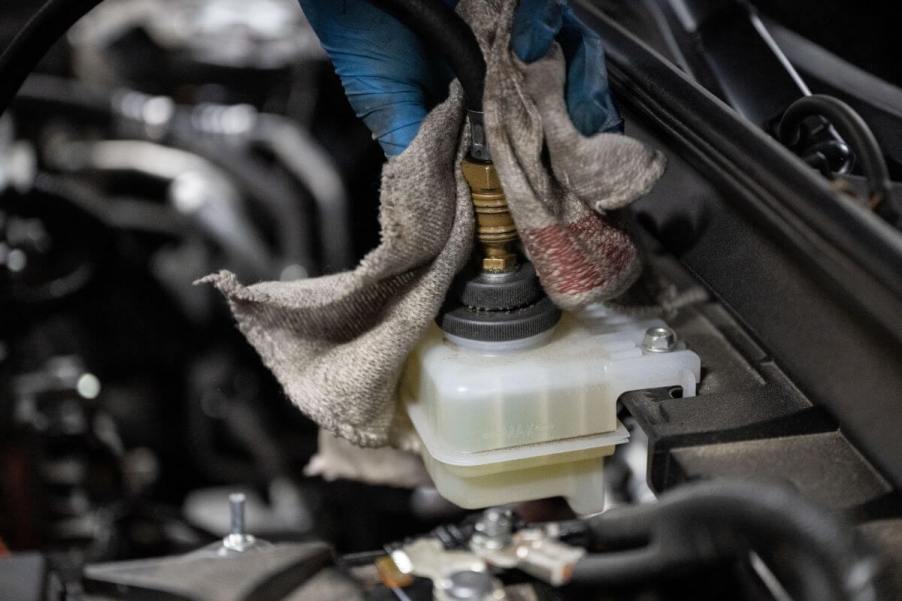
What Happens if You Drive Without Brake Fluid?
Your vehicle has many components and fluids that keep it operating at peak performance day after day. From engine oil to antifreeze, to windshield wiper fluid, to brake fluid, all of these fluids work to keep your car safe, cool, and clean. However, in your braking system, what exactly does brake fluid do? Here is everything you need to know about brake fluid, what it does, and why it is so essential to make sure your braking system has the right amount of fluid at all times.
What exactly is brake fluid?
According to Tires Plus, brake fluid is a liquid chemical solution used in modern vehicles with hydraulic brakes. If you are driving a modern car today, your vehicle uses a hydraulic braking system. These hydraulic braking systems use a fluid that is compressed when a brake pedal is pushed. When this fluid pressure reaches the brake calipers or drums at the wheels, brake pads are used to create friction at the wheels, thus stopping your vehicle. Brake fluid is the hydraulic fluid that makes this whole process a reality.
This brake fluid is housed in your brake master cylinder. If you are looking under the hood of your car, this master cylinder is often located right in front of the steering wheel on the driver’s side, connected to the brake pedal. In old vehicles, master cylinders only contain one reservoir for brake fluid. Still, in modern cars, this master cylinder is often broken into two separate reservoirs, one that sends fluid to the rear wheels and another that sends fluid to the front wheels.
What happens if you drive without brake fluid?
Simply put, if you don’t have any brake fluid in your master cylinder, your vehicle will not be able to stop. Brake fluid is one of the most critical components in your car. Without it, there is simply no way to come to a stop safely. In the past, failing brake components were pretty common in cars. These old vehicles had braking systems with no redundancies. If you spring a leak in a brake line somewhere in your car, all the brake fluid will spill out, leaving you with no brakes. Luckily, modern vehicles with their redundant master cylinder reservoirs resolved most of these issues. If you spring a leak in a brake line, you’ll only lose braking power for some wheels, not all of them.
In modern cars, you have an auxiliary brake, often called a handbrake or parking brake. In the past, these were called emergency brakes. These parking or emergency brakes use a cable to set the brakes on your vehicle, acting as a fluid-less solution to stopping if your brakes fail. Luckily, today, these auxiliary brakes are usually used for parking purposes. Still, in the past, they were also some of the only life-saving solutions drivers had to stop their vehicles while experiencing brake failure.
How do you know if you have low brake fluid?
To keep your vehicle stopping properly, you must ensure that your car always has the recommended amount and type of brake fluid. Luckily, braking systems are often sealed systems, where fluid will not be lost over time unless there is a leak or failure somewhere in the system. According to Firestone, some of the most common indicators of low brake fluid include a warning light illuminated on the dash, a low-performing or squishy-feeling brake pedal, or fluid pooling near one of the wheels, indicating a leak at the brake itself.
Under these conditions, you will also often experience a lack of stopping power in your vehicle. You may notice it takes longer for your car to brake than usual, and under some circumstances, you may feel like your brakes are not working at all.
How do you fix a braking system with no brake fluid?
As previously stated, your brake fluid should never be low. Your vehicle may burn some oil, and your coolant may evaporate a little over a long period, but your brake fluid should never leave the system. You can fill your master cylinder up to the recommended amount, but a potential leak in the system should be addressed before any lengthy driving.
When replacing the brake fluid in a vehicle, drivers should refer to their owner’s manual, which indicates when a brake service should be completed on a car. Brake fluid starts as a clear fluid, but over time, it turns black with debris and age. Ensure your vehicle stays safe on the road with fresh brake fluid so you can always stop quickly!




